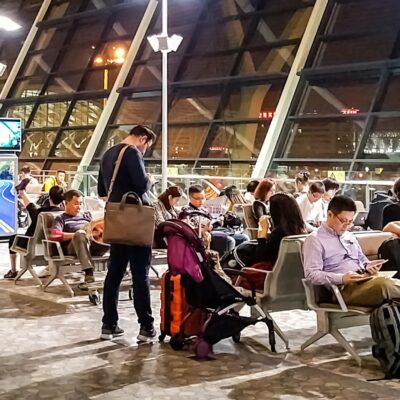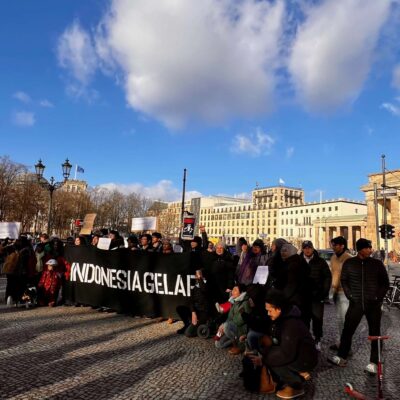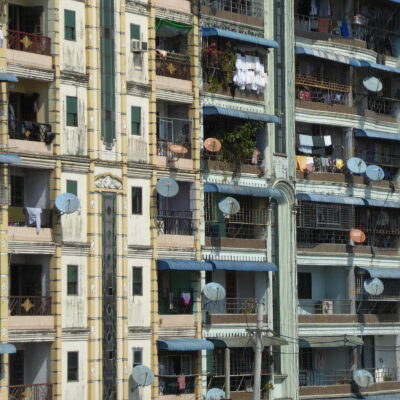The post-Cold War period has seen the emergence of governments across the globe which have hijacked democratic practices such as elections, media freedoms and political opposition as part of their strategy to retain, rather than diffuse, power. Such regimes are referred to as ‘hybrid regimes’ because they blend elements of traditional authoritarian rule with some of the political norms, practices and institutions typically associated with democracy.
However, very little attention has been paid to the role that civil society plays in these complex political environments. Where civil society has been addressed, it is typically to measure the extent to which it plays a role in either successful democratic transition and consolidation or in bolstering authoritarian stability.
My recent work therefore seeks to extend existing studies of civil society in hybrid regimes by demonstrating that they can agitate against the state, advocate for democratic freedoms, shape government policy and win significant political victories even when their actions do not lead to a more robust democracy.
To demonstrate, I investigate the complex role that trade union activism has played in post-2003 Iraq as one case study indicative of the complex interface between civil society and the state in hybrid regimes.
Civil society and democracy
Before analysing the case of Iraq, it is important to acknowledge that there are two opposing schools of thought on whether or not civil society plays a positive role in enhancing democratic transition and consolidation.
In the first, civil society is said to promote a sense of community which in turn fosters a tolerance of diversity, a willingness to compromise and the motivation to engage in collective action. This dates back to the observations of 19th century French politician and philosopher Alexis de Tocqueville that America’s democracy was bolstered by a rich collection of voluntary associations around which citizens would organise. Over a century later, political scientist Robert Putnam gathered evidence in Italy and concluded unequivocally: ‘Tocqueville was right: Democratic government is strengthened, not weakened, when it faces a vigorous civil society’.
However, a second model has emerged in which scholars have repeatedly cautioned against overstating the positive relationship between civil society and democracy. For example, political scientist Sheri Berman studied Weimar Germany and found that the abundance of civil society networks led citizens to retreat into distinct subcultures, creating a political vacuum later filled by the National Socialists. She concluded that ‘a flourishing civil society does not necessarily bode well for the prospects of liberal democracy’.
However, what is problematic here is that both models focus on measuring the extent to which civil society does (or does not) lead to democratic transition and consolidation. This is not very helpful when analysing contemporary hybrid regimes like that of Iraq; and the complex and nuanced ways in which civil society interfaces with the state in such a context.
To demonstrate, the below briefly traces the evolving political program of Iraq’s largest trade union movement, the Iraqi Federation of Oil Unions (IFOU), through 15 years of complex Iraqi politics (2003-18).
Trade union activism after regime change
From its inception in April 2003 the IFOU was very clear about its two central platforms: it was adamantly opposed to the US occupation; and it sought to protect Iraq’s oil sector from privatisation and international plundering.
In May 2003, just one month after regime change, the IFOU faced its first challenge in the form of a Coalition-backed plan to outsource the labour force at Iraq’s key oil fields to a Kuwaiti firm.
Faced with mass unemployment, the IFOU organised strikes that eventually brought oil production to a halt for several days.
By January of 2004, the IFOU had claimed its first major victory—they had successfully negotiated with the Coalition Authority and the Ministry of Oil to provide Iraqis with jobs and to ensure that workers were paid fairly and in a timely manner.
Capitalising on these early victories, the IFOU began to really flex its political muscles in response to US-backed plans to privatise Iraq’s oil industry. In May 2005, the IFOU hosted a major international conference, urging members of Iraq’s newly installed Parliament to take a stand against the US’ plans to privatise Iraq’s oil.
In June, around 15,000 workers conducted a peaceful 24 hour strike, cutting most oil exports from the south of Iraq. This particular strike was in support of demands that a higher percentage of Iraq’s oil revenue be invested back into the country’s infrastructure.
Overall, the actions of the IFOU under the early years of the US-led occupation reveal a trade union movement determined to fight on behalf of Iraq’s workers and to resist foreign plundering of Iraq’s oil wealth. While this led to some modest political victories, the actions of the IFOU did not portend democratic consolidation.
This demonstrated the nuanced role that civil society plays in such complex political contexts, as well as the limitations of the two schools of thought on whether or not civil society plays a positive role in enhancing democratic transition.
Civil society under Iraq’s hybrid regime
In December 2005, federal elections saw Nouri al-Maliki of the Da’wa Party elected as Prime Minister. It was under Maliki’s leadership that Iraq emerged as a fully-fledged hybrid regime.
During Maliki’s incumbency, the Iraqi government attempted to draft a new Oil Law that sought to open Iraq’s oil sector to foreign investment from major multinational conglomerates.
The IFOU leadership vehemently opposed the law and the Maliki Government’s kowtowing to global oil firms. Not only had the Iraqi government failed to consult the IFOU and the broader domestic oil sector in the drafting of the law, but the IFOU also viewed it as a blatant attempt by the US and the Iraqi government to commandeer Iraq’s oil wealth for their own profit.
When the Iraqi government continued to ignore the objections of the IFOU to the draft law, some 600 members of the IFOU went on strike across southern Iraq in June 2007, bringing an immediate halt to oil extraction and refinement across several key wells.
A few days later, Maliki responded by stating that he would ‘strike with an iron fist anyone that would tamper with the public order or carry out evil schemes undermining the state’s higher interests’, labelling the IFOU’s leaders ‘outlaws and saboteurs’. Within days the Iraqi military surrounded the oil workers and arrest warrants were issued for several union officials.
The suppression of Iraq’s trade union sector continued in the context of the 2011 ‘Arab Spring’. When scattered protests erupted across Iraq, including those which called for an end to Maliki’s leadership, the Iraqi government introduced severe new ‘anti-terror’ legislation that authorised the Iraqi Security Forces to use ‘all known methods to disperse protestors’, including unlimited force.
This led to government raids on union offices, the seizing of assets, the harassment and intimidation of the IFOU, and the arrest of several senior members.
In February 2013 another round of protests erupted amongst the oil workers of southern Iraq that eventually led approximately 1,000 oil workers to create a tent city outside the Southern Oil Company headquarters in Basra.
In response, the Maliki government continued their crackdown on Iraq’s civil society, including the issuing of more than US$600,000 in fines against 16 union activists. It also included the arrest of several senior IFOU leaders who were tried under outdated Baathist-era laws prohibiting union activity.
The case of the IFOU during Maliki’s incumbency therefore presents a pertinent example of the complex relationship between civil society and the state in hybrid regimes. On the one hand, the IFOU went to great lengths to promote democratic norms in Iraq; while on the other hand, their best efforts led to few significant political victories and did not consolidate Iraq’s fledgling democracy.
Gradual reform
In August 2014, Maliki was replaced by fellow Da’wa Party member Haider al-Abadi. Although Abadi was a more inclusive leader than Maliki, Iraq remained a hybrid regime during Abadi’s incumbency. One way to demonstrate this is via the complex relationship between Abadi’s government and key civil society actors such as the IFOU.
Among the key campaigns of IFOU during 2014-2015 was to lobby the Abadi government to draft and ratify a new Iraqi labour law. This was to pay off in August 2015 when the Iraqi Parliament passed Labour Law 37 which granted Iraqi workers the right to strike, unionise and bargain collectively. The new law also prohibited child labour, arbitrary dismissals, any form of discrimination along ethnic or religious lines, and was acknowledged across the world for its progressive stance on women in the workforce.
However, despite important improvements to labour rights, Law 37 had significant problems: it excluded workers from across Iraq’s vast public sector, meaning that the new law did not apply to members of the IFOU. Not surprisingly, protests erupted across Iraq following the unveiling of the law as workers called for parliament to extend it to the public sector.
Throughout these protests, the IFOU continued to play a pivotal role, co-ordinating rallies, lobbying government officials and agitating for political reform despite the complexities of Iraq’s political and security environment at the time.
These gradual reforms and the IFOU’s persistent use of nonviolent political advocacy appear to support the Tocquevillean notion that civil society inherently bolsters democracy. However, Iraq remains very far from a robust and consolidated democracy and the freedoms accorded to trade union movements remain tenuous.
Such complexities are sometimes missed in studies which seek to categorise the relationship between civil society and the state in hybrid regimes as either fostering or undermining democratic reform.
Conclusion
What does the case of the IFOU in Iraq since 2003 tell us about the complex relationship between civil society and the state in hybrid regimes?
On the one hand, the role of the IFOU might lead some to argue that it confirms the enduring utility of the notion that civil society plays a positive role in democratic transition and consolidation. As evidence, they could point to the fact that the IFOU’s actions highlighted government missteps and effected some meaningful political reform.
On the other hand, however, some might see the case of the IFOU as evidence that a burgeoning civil society does not necessarily portend democratic transition or consolidation. There is certainly ample evidence to suggest that, despite their best efforts, the actions of the IFOU failed to produce a significant advance in Iraq’s broader democratic consolidation.
Indeed, by any reasonable measure—corruption, economic growth, human rights, civil liberties, violence, public discontent, and the performance of political institutions—Iraq remains very far from the democratic ideal.
However, the case of the IFOU also reveals the limitations of these two models. By measuring the successes and failures of civil society via the extent to which it has led to democratic consolidation, or, alternatively, worked to bolster authoritarian stability, both models may obfuscate the complex and nuanced interface between civil society and the state in hybrid regimes. To put it another way, the IFOU doesn’t fit neatly into either model: it neither consolidated Iraq’s democracy nor worked to reinforce the durability of its hybrid regime.
This therefore has implications beyond the case study of contemporary Iraq and the example of the IFOU, holding valuable lessons for those seeking to analyse and interpret the rise, proliferation and resilience of hybrid regimes in the post-Cold War era; and the role that civil society may or may not play in advancing democratic reform.
Image: Firefighters fight an oil blaze on a wellhead at Gas Oil Separation Plant 6 in Southern Iraq, March 2003. Credit: LCPL Dick Kotecki/US Department of Defense.




